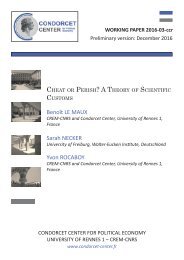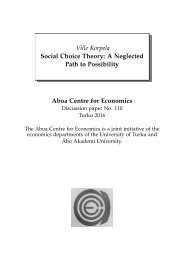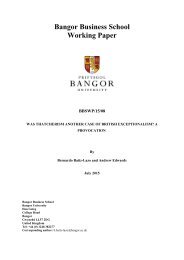MEMORANDUM
n?u=RePEc:hhs:osloec:2016_018&r=hpe
n?u=RePEc:hhs:osloec:2016_018&r=hpe
You also want an ePaper? Increase the reach of your titles
YUMPU automatically turns print PDFs into web optimized ePapers that Google loves.
a youthful prank. But it was certainly more serious and important than that. The textile<br />
industry of St. Petrograd was at the turn of the century the largest industry in St. Petersburg<br />
in terms of employment. There were strikes at several textile factories in St. Petersburg in<br />
May-June 1896. The strike among the textile workers spread quickly and at one point in<br />
June 1896 it comprised all textile workers in St. Petersburg. Another wave of strikes<br />
followed in January 1897. The textile workers’ struggle for improvement of harsh<br />
working conditions was met with sympathy and material support in wider segments of the<br />
society. Leontief Sr. had graduated from the gymnasium at 16 years of age in 1896; and<br />
his involvement in the strike took place soon afterwards. The conflict resulted in the<br />
adoption of a law in 1897 limiting daily working hours to eleven and a half.<br />
Strikes were not tolerated by the oppressive Tsarist regime and might have serious<br />
consequences for those involved. Leontief Sr.’s involvement in the textile workers’ strike<br />
indicates that he was connected with political circles. He joined later the Socialist<br />
Revolutionaries (SRs), the ideological heir to the Narodniki (Populists) of the 19th century,<br />
which drew its support from rural Russia on a program of agrarian socialism, as opposed to<br />
the emerging Social Democratic Workers Party (SDs) which relied on Marxist doctrines<br />
and later split into Bolsheviks and Mensheviks. But as the youngster Leontief Sr. was in<br />
1897 his political views may not have been elaborate beyond the views that all the<br />
revolutionary movements of Russia shared: political freedom and abolishment of the<br />
autocratic Tsarist rule.<br />
Leontief Sr.’s involvement with the strike made him persona non grata with the<br />
authorities, quite likely preventing him from entering St. Petersburg University. Perhaps<br />
his honorary citizenship as a member of the Leontief family saved him from harsher<br />
sanctions? The strike involvement of Leontief Sr. doesn’t seem to have caused any fallout<br />
with the larger Leontief family. Perhaps the family on the contrary appreciated his political<br />
involvement and facilitated and supported him in his voluntary exile.<br />
After having been enrolled at the Higher School for Commerce in St. Petersburg<br />
Leontief Sr. left for Germany to study at the newly opened Leipzig Handelshochschule in<br />
1899, graduating two years later. After Leipzig he entered doctoral study at Munich<br />
University in 1902, completing it eventually in 1906. He suspended his Munich university<br />
enrolment, however, in 1904/05 to spend one year in Paris. During that year he met Zlata<br />
Bekker (1881-1979), a well-educated and strikingly beautiful woman of Jewish extraction<br />
who studied in Paris. Possibly they might have become acquainted earlier. Zlata Bekker<br />
(1881-1979) had come to Paris from Odessa in 1901. She belonged to a well off Jewish<br />
family with economic interests in transportation business. Jews were barred from<br />
university enrolment in Russia; hence Jews who could afford it went abroad to study. Zlata<br />
chose Paris rather than Germany and studied briefly medicine at the University of Paris.<br />
She changed to a study of art and art history in a Russian school of higher education<br />
established in Paris. Zlata Bekker was described at the time as a striking, exotic beauty.<br />
8





